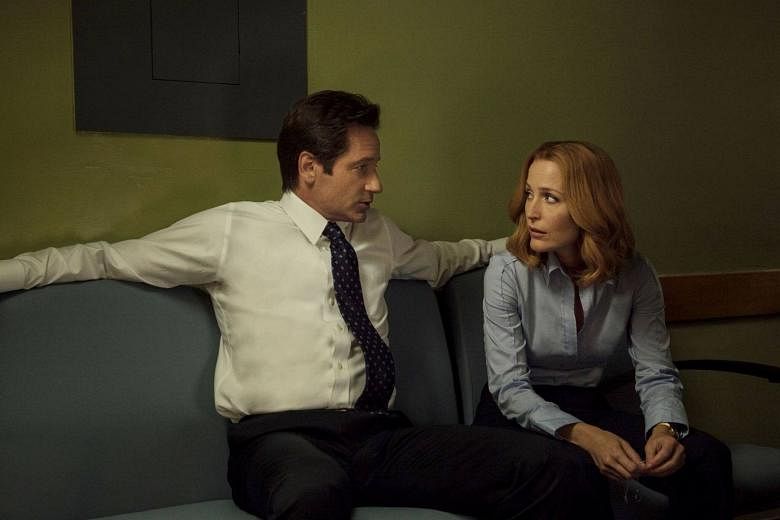With its story of a secret government plan to hide the existence of aliens, did hit show The X-Files help steer conspiracy theories into mainstream culture?
It is a loaded question, given that such theories may have contributed to the erosion of trust in objective facts - a development that has been highly politically charged in the United States with the antiscience bent and espousal of "alternative facts" by the Trump White House.
So when The Straits Times puts this question to the show's writer-producers - Jim Wong and brothers Glenn and Darin Morgan - it is to their credit they do not entirely shirk responsibility for being one of the first TV shows to introduce the concept to mass audiences.
The first reaction from Glenn, 71, is to laugh good-naturedly. "Oh no, don't blame us," he says with mock horror. "None of us back in the day was buying into that stuff. It was, like, 'What could you create that was possible?' And most of our stuff was UFO-related, that aliens were here and all that.
"But when we look at (conspiracy theories now)... we just think it's so beyond anything we were even proposing as entertainment. You know, (like) what (the right-wing conspiracy-theory and fake-news media platform) InfoWars is saying."
Referring to InfoWars host Alex Jones, whom US President Donald Trump has praised, he says: "I used to check out Alex Jones back in the day and go, 'This is too weird even for us.'"
Wong, 58, says: "I think your question was, 'Do you feel a little responsible for creating (today's) conspiracy theories?' We may have brought them into more of the mainstream because it is a network television show. But those theories and their proponents have been in existence since we began doing the show.
"It's just that I think we had a chance to reach a larger audience and, maybe, if you're saying, 'Does that allow the audience to more readily accept conspiracies?', I guess so.
"But if you look at All The President's Men (1976) and other suspense movies..., I think that idea has always been around, even with president John F. Kennedy's assassination in the 1960s.
"So I think what we did was tap into something that was more or less hidden in the beginning when we were doing it, but I don't believe that we're at the forefront of what's happening today."
The 11th and current season of The X-Files explores how conspiracy theories have become loonier over the years, says Darin.
"This season has addressed the fact that Mulder was sort of an outcast when we originally did it and now the conspiracy theories that are out there are too crazy even for him," notes the 69-year-old.
"The old conspiracy theories seemed to be more about the government not telling you certain facts that it has. Now so many conspiracy theories are just crazy and just making stuff up and there are certain theories Mulder would never believe for a second that are now entertained in the mainstream media."
And there are other elements of the show's legacy that the trio are proud of - among them, the creation of the character Dana Scully, the medical doctor and special agent played by Gillian Anderson.
Scully went on to become a feminist icon and role model, and creating a strong female lead like this for the series "was really important to Jim and I", Glenn recalls.
Even though the character's feminist leanings "upset (some) people so much", it inspired generations of women and girls, he adds.
"We had a Comic-Con reunion a few years ago and a girl got up to address Gillian and said, 'I'm a two-time PhD in theoretical physics and it's because of Dana Scully.' And you feel so proud that you had some part in that."


